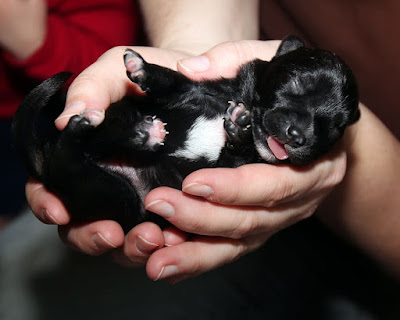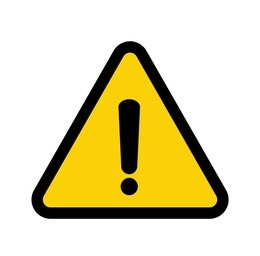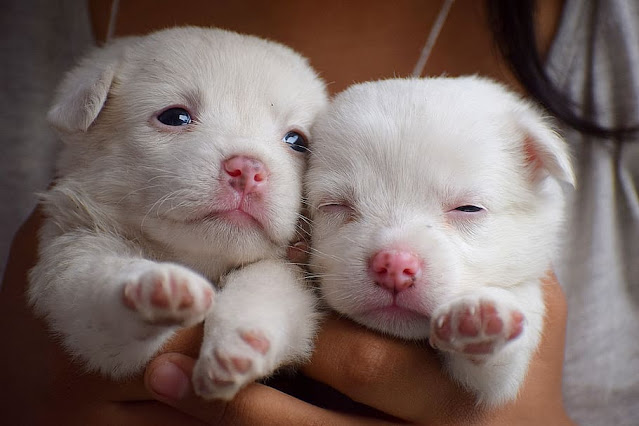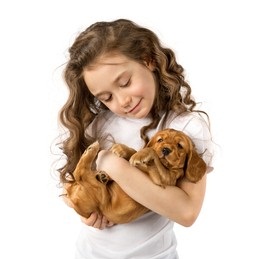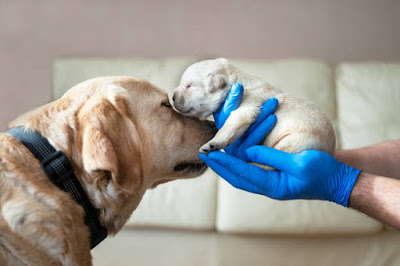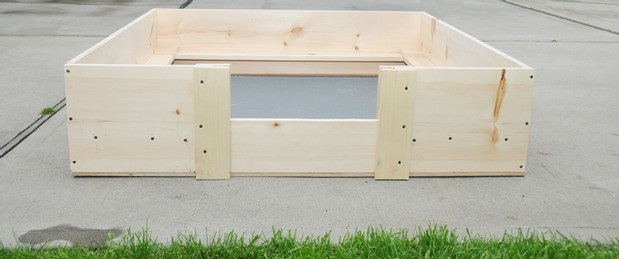Helpful Tip: Did you know that the age at which you may sell and buy puppies varies by state in the United States?
Newborn puppy care tips
Week after week, newborn pups develop at a quick rate. They are gradually opening their eyes, eating solid food, mingling with other dogs, and no longer require the use of a heat light for pups to maintain their body temperature. They do, however, require some additional newborn puppy care throughout those early stages of their lives.
Make sure the pups are feeding and latching on to their mother's nipples on a frequent basis. You may need to bottle-feed them if this does not happen. Keep an eye on their health and look for symptoms of illness such as diarrhoea, vomiting, or a lot of crying. You can start giving the puppies a combination of milk and dry dog food at 4 to 8 weeks of age to get them used to dry food.
You'll also need a scale to keep track of the puppies' weight; ask your physician what the proper weight for newborn puppies should be week by week. You'll need to take your puppies in for vaccines at the age of 6 to 8 weeks. They should be kept away from other dogs until then, in case those dogs aren't vaccinated.
Further care for puppies
After your pups have had their immunizations, you'll need to socialise them with other people and canines between the ages of 7 and 4 months. This is an important stage in their development because it ensures that they get along with other canines and people. Take your puppies on walks on a regular basis to expose them to new sights and scents, and consider enrolling them in puppy courses. Your puppies will be well adjusted and set up for success throughout their lives if they are socialised early.
Always consult your veterinarian before making any changes to your pet's food, medication, or exercise programme. This material is not intended to replace the advice of a veterinarian.
Will the mother reject newborns if you touch them?
This is a hoax, according to many tales I've seen online. In fact, the following remark from the Cuteness.com website sums it up best:
"There is a long-held belief that touching young animals would lead them to be rejected by their mothers. Almost never is this the case, and puppies are no exception. Family dogs, in fact, are frequently highly tolerant of their favourite people caressing their young."
However, this does not imply that you should always be caressing the pups.
When the Mother Totally Neglects the Puppy
There will be occasions when your dam neglects her babies.
This type of thing happens to dogs in the same way that it does to humans.
If your dog prefers to be with you rather than her puppies, keep the whelping box close by.
So she may keep nursing and tending to her puppies while you're around.
This is common among first-time mothers, especially if they have spent the majority of their time with you.
There are female dogs who are overly connected to their people and are distressed or in need of comforting.
They'd prefer be with their parents than with their babies.
When the Newborn Puppy Accidentally Moves Away From the Mom
When a mother needs to pee or defecate and leaves the box, this is a regular occurrence.
Some newborn pups will strive to find their mother, but by the time she returns, they are already separated from her (if your whelping box has a lot of room for movements).
If this occurs, return them to their mother as soon as possible to keep them warm.
Supervising children with puppies
You may be aware that when holding the pups, you should be as soft as possible. However, if there are youngsters who want to hold them, you should advise them not to. Make sure you're present when the pups are being held by children. Make sure there aren't any other dogs around so the mother doesn't get defensive and violent.
How to care for newborn puppies
You now know when it's safe to touch newborn pups and how to care for them. More information on how to care for a newborn dog may be found here. If the puppies are with their mother, you should not intervene; instead, keep an eye on them and make sure they are both healthy. Provide a clean and comfortable environment for the family, as well as appropriate food and water for the mother dog throughout the nursing stage.However, if their mother is unable to care for them, it is critical to know how to care for babies so that they remain secure and healthy.
Step 1
Keep the newborn pups away from small children and other animals in a secure location. It is your responsibility as their adoptive parent to keep them warm. Place a heating pad in a nesting box, covered in a thick, soft towel. A strong cardboard type should suffice. During the first week, keep the temperature in the region between 90 and 95 degrees. As a gauge, a fish aquarium thermometer should suffice. Reduce the temperature by 5 degrees every week as they become older, until they're five weeks old and can withstand room temps of around 70 degrees.
Step 2
For the first week of life, feed the puppies a canine milk substitute every two hours. The easiest method of feeding is using a bottle, which allows you to keep track of how much your pups eat. Place the bottle in a warm basin of water to heat the milk to 98 degrees. Reduce feedings to every three hours throughout the day and every four hours at night after this phase. Increase the time between feedings by one hour by the second week.
Step 3
Assist the pups in learning to pee and defecate in the manner in which their mother would if she were there. Wipe their vaginal and anal regions with a warm, damp towel. This will encourage the puppy to relieve herself in a few minutes. After that, wipe down the area with the cloth. After each meal, repeat the process. Consult a veterinarian straight away if the puppies are not able to relieve themselves.
Step 4
Unless you're feeding or cleaning the pups, don't pick them up for the first two weeks. By the third week of life, the pups' senses, including as eyesight and hearing, have sharpened, and you should begin gently handling them a few times each day to acclimate them to their surroundings and aid their social development.
Step 5
At the third week of life, start giving dry puppy chow soaked in milk substitute or water three times a day. Just enough water to make it mushy. By the age of eight weeks, they will have been progressively weaned to solid food. During the whole eight-week period, continue to bottle feed.
How to take care of orphaned pups
In certain sad circumstances, you may be forced to care for orphaned newborn puppies. Keep in mind that they will require extra attention and care. First and foremost, they must be fed often and with a formula designed particularly for pups. It's possible that you'll have to hold the puppies while feeding them. When bottle-feeding newborn puppies, follow the guidelines listed above. Keeping the pups warm is also essential. Place them in a heated box with an open top and blankets to keep them warm.
Urinate and defecate will also require your assistance for the newborn puppies. Normally, the mother dog licks the vaginal and anal areas of each puppy on a regular basis, activating the elimination reflex. Wipe the puppy's genital and anal areas with a wet cotton or gauze pad shortly after each meal to achieve the same effect. More information on how to make a newborn puppy defecate, as well as additional guidance on caring for orphaned puppies, may be found here.
Keep an eye on the navel of a newborn dog. To avoid infections, keep it clean and dry at all times. Also keep a watch on the eyes of the newborn puppy, which will be closed for the first 7-8 days. An infection might be indicated by irritation in the eyes before they open, necessitating veterinarian treatment. When caring for an orphaned newborn puppy, it is usually a good idea to see a veterinarian with any queries you may have.
When is it safe to separate pups from their mothers?
Finally, pups should be maintained with their mother and siblings for at least eight weeks if feasible. Newborn pups and young puppies are in a delicate period of development. It is vital for children to be socialised with their mother and siblings throughout this period to guarantee appropriate growth. Puppies can be adopted after they reach the age of two months. If you've recently acquired a puppy, watch the video below to learn all you need to know about puppy care.
Socializing
Puppies are ready to start interacting with adults and other puppies at the age of four weeks. You can now start holding them more frequently and for longer periods of time.
When they're around 2 weeks old, the breeder should hold them for a minute or two each day. This should be extended to at least 5 minutes every day after 4 weeks. This period helps the puppies to grow used to human scents and the sensation of being touched.
Puppies must be socialised with other people and animals between the ages of four and sixteen weeks. They should interact with children, pets, and other people. Try to make these contacts as nice and beneficial as possible.
These encounters will be crucial in determining the pups' tolerance and temperament as they grow older. Negative encounters with puppies can have a lasting impression on them.
When You Have to Clean the Whelping Box
Your dam will have vaginal discharge for 4-8 weeks after giving birth, which will create marks and stains behind the whelping box.
You should monitor this on a frequent basis to ensure that the discharge quality remains normal and does not deteriorate.
It's also a good idea to clean your dam and the whelping box to ensure that your puppies are always in a clean environment.
You must touch and move your pups while cleaning the box.
As this occurs, you must act quickly to avoid exposing your puppies and keeping them separated from their mother for an extended amount of time.
Weighing the Puppies
It's critical to weigh your newborn puppies since weight loss is a big concern for puppies.
It's an indication that something's awry, and you'll require help right now.
To avoid this, you must weigh your puppies at the time of birth and once a week thereafter.
When Milk Supply is Not Adequate
There are rare occasions when a mother's milk is insufficient for her puppies.
This is more likely to occur if you have a larger litter size, as some dogs give birth to 10-12 puppies on average.
When this happens, you'll need milk supplements in your whelping kits, as well as assistance feeding your dam's infants.
You must be able to feed them while keeping them close to their mother, yet touching the newborns is unavoidable.
Make sure you have clean hands when doing this, and if there's a chance you can feed them while they're still in the whelping box, do it instead.
Conclusion
When a puppy is born, you'll need a lot of self-control not to reach out and touch it. With their closed eyelids and beautiful tiny pink paws and nose, they appear little and defenceless.
However, when they get larger and pass the age of three weeks, touching them will assist them in acclimating to people. It should help them socialise and prepare for the separation from their mother, which can begin as early as 8 weeks of age.
If you can, I feel you should avoid handling puppies before this and allow mom the space she needs to be a mother.
More Articles

